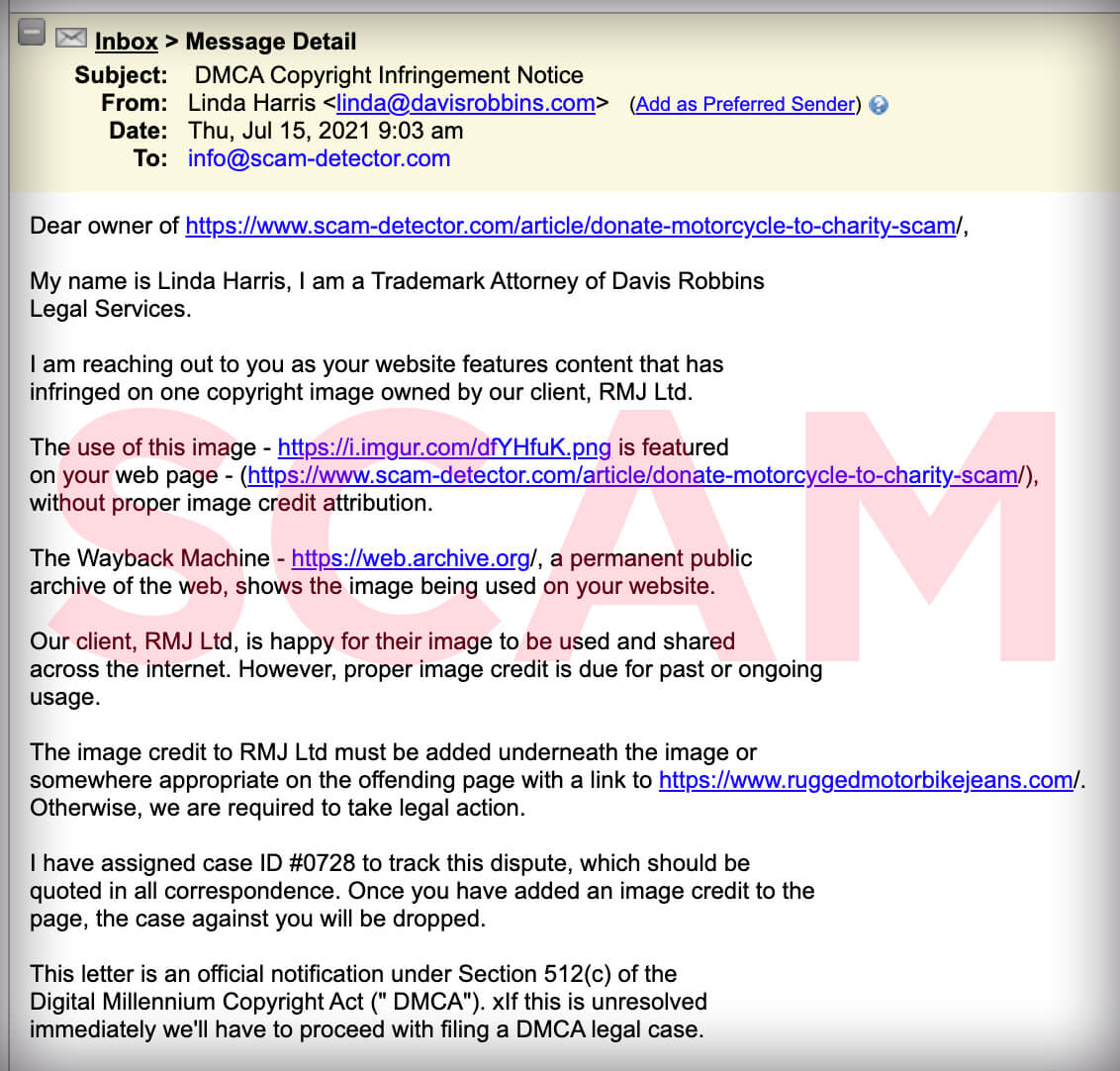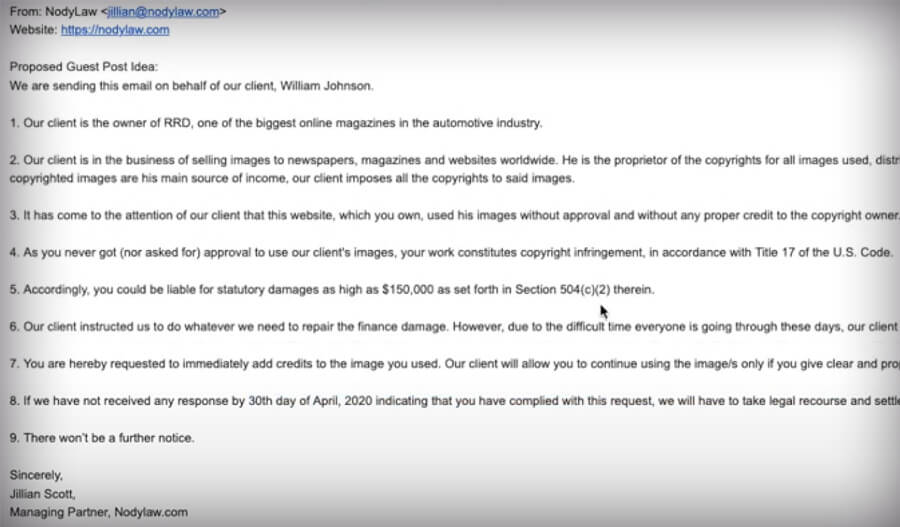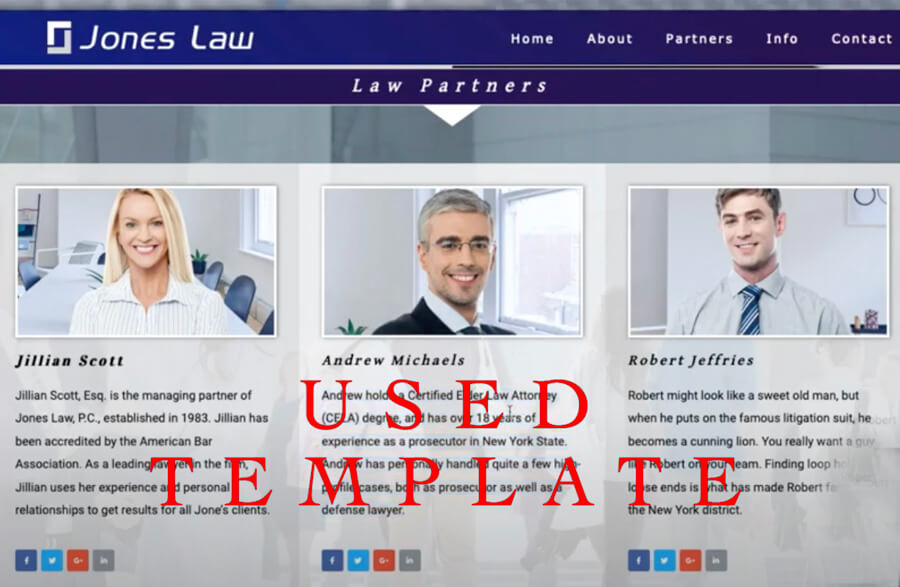Backlink Law Firm: How The Scam Works
Did you receive an email from a ‘lawyer' called Linda Harris from a law firm supposedly called Davis Robbins? You are not alone. You may be the victims of the Backlink Scam, or the DMCA Copyright Infringement scare. Let's dive in to see how it works.
Most Search Engine Optimization (SEO) companies do their best to make the websites of their clients show on the search engine results. However, some agencies posing as law firms prey on the innocence of people to lure them into SEO scams that are hard to detect. If you have a website, the Backlink Scam perpetrators are out to get you. Here is more.
Scam Detectors Most Trusted Websites in Online Security
- Guard.io (100): Surf the web safely. Clean up your browser, remove maliscious extensions and check for privacy violations.
- Incogni.com (100): Delete your personal data from the internet and protect against scams and identity theft.
- ExpressVPN (100) Stay secure and anonymous online - Best VPN Out There
Questionable SEO companies contact website owners and bloggers and claim to be attorneys accusing them of infringing on copyright laws. The last fake law firm names used – besides Linda Harris from Davis Robbins – are NoDy, Jones Law, Jillian Scott, Andrew Michaels and Robert Jeffries.
The content of the email states that “It has come to our attention that the website you own uses images without approval and proper credit to the copyright owner.” They will even point at some specific photos you have published on your website.
The bogus lawyers make a demand that the website owner should include a backlink of their client's page on the blogger's site, or else they will face strict legal action. Beware, these are non-existent firms with deceiving information to scare you into doing something that you shouldn't.
The whole purpose of the scam is for the sketchy SEO company to place as many backlinks as possible on many high-authority websites, which will increase the chance of their sites being seen in online searches, whether it's on Google, Bing or Yahoo.
As buying backlinks is expensive – not to mention that is also considered a black hat SEO practice (non-compliant with the search engines terms), faking a law firm would get the scammy SEO companies a better chance of ranking for better results. Here is a screenshot of the email a we received from ‘Linda Harris':

The content states:
“Dear owner of [your domain],
My name is Linda Harris, I am a Trademark Attorney of Davis Robbins Legal Services. I am reaching out to you as your website features content that has infringed on one copyright image owned by our client, RMJ Ltd. The use of this image – [insert image from your website] is featured
on your web page – [insert your article link], without proper image credit attribution.
The Wayback Machine – https://web.archive.org/, a permanent public archive of the web, shows the image being used on your website. Our client, RMJ Ltd, is happy for their image to be used and shared across the internet. However, proper image credit is due for past or ongoing
usage.
The image credit to RMJ Ltd must be added underneath the image or somewhere appropriate on the offending page with a link to https://www.ruggedmotorbikejeans.com/. Otherwise, we are required to take legal action.
I have assigned case ID #0728 to track this dispute, which should be quoted in all correspondence. Once you have added an image credit to the
page, the case against you will be dropped. This letter is an official notification under Section 512(c) of the Digital Millennium Copyright Act (” DMCA”). xIf this is unresolved immediately we'll have to proceed with filing a DMCA legal case.
I am providing this notice with authority to act on behalf of the owner of the copyright(s) involved.
Regards
Linda Harris
Trademark Attorney
Davis Robbins Legal
528 Market St.
New York, NY 07840
[email protected]
www.davisrobbins.com”
Super realistic, right? Well, below we will show you a few ways you can use to find out if the ‘lawyer' contacting you is a scam.
Why Does The Scam Work?
If you take a look at the content of the message, you'll find that the law firm stating the alleged crimes you've committed even has a website of its own, which looks legitimate at first sight. We'll teach you below how to detect the fake, but keep in mind that this type of mail is enough to strike fear into the heart of any blogger because of the implications.
The email may contain statements such as: “you could be liable for statutory charges as high as $150,000”, “deadline by August 15”, or “we will have to take legal recourse and settle it in court.” These terms are intended to scare whoever is receiving this email.
Here is another screenshot from an email coming from a Jillian Scott from NodyLaw:

However, it all ends up being a false claim. The scam works because the “law firm” doesn't require a payment, but rather a straightforward settlement of posting a link on your website. Many people are just happy to do that, not knowing the results of such action.
It's best not to let your emotions dictate what you should do.
Watch the video below to see how the scam works precisely:
If you take a close look at the details of the email and carry out some background check on the law firm, you'll find out that it doesn't exist. Don't expect the scammer to come at you easily because they would try to use their fake position to force you into a poor decision.
Here is how to detect it.
How To See If The Website Is Fake
Before going ahead and respond to such a message, it's best that you do some personal research to arm you with vital information. First, make sure that you scan through the email and ensure that you don't click or follow any links embedded in it. It's also a great idea to avoid rushing to the website of the scam company because it may contain malware.
Here is how to determine if a website is fake:
-
Use Google Safe Browsing.
-
Check Scam Detector's website validator to see how trustworthy the law firm's website is.
-
Look for grammar mistakes.
-
Analyze the complexity of the site.
-
Check out the domain owner on whois.net.
-
Verify the physical location.
-
Do a reverse image search on images.
-
Type into the search engines the names on the “Meet the team” paragraph.
Let's take a look at all of them.
Use Google Safe Browsing
When you are in doubt about a page that you want to open on the Internet, you can use Google Safe Browsing site status to determine if the website has malware or anything related to it. If you're given the clear, you can then go to this website to check it out.
Check Out Scam Detector's Website Validator
Run the domain name of the law firm through our Website Validator. It will tell you how trustworthy their website is. In our case, www.davisrobbins.com has a rating of 1.8 out of 100! The Validator tells you how old the domain is, a phishing score, a spam score, and proximity to other suspicious sites. Again, in our case the domain davisrobbins.com was created only a week ago (at the time of this writing) while the phishing/spam/proximity scores are very high.
Look For Grammar Mistakes
Typically, these scams are not perpetrated by people with a high level of academic education, so occasionally you could find grammar mistakes that would give away a scam. The content on the scammer's website will be poorly written and have been taken from an identical site. That's a clear sign.
Analyze the Complexity of the Site
The scammer's website will also be poorly designed. Usually, they will opt for a one-page website with only skeletal information. Just like in the video presented above, the site that Josh was sent from Nody Law looked only halfway legitimate. A law firm never has just a landing page on its website. The names Jillian Scott, Andrew Michaels, and Robert Jeffries are the same on every template.

Who Owns The Domain?
Next, you should look to identify the owner of the domain which the website is hosted on. Check out Whois.net for the name of the registrant. There will not be a lot of information for you to find there – and the name of the owner may be hidden for a few – but a close look will reveal that the main servers will have IPs in a completely different location. The website will be hosted on sketchy servers that don't comply much with the identity of the firm they are pretending to be.
In Josh's case above, the Nody Law firm's website was registered in China. Uh oh.
Do They Have a Physical Location?
After this, you may decide to take things even further by searching for the company address on Google Maps. The address may be invalid or be that of another property/building. A further search of the text on the website will reveal that it has probably been copied from another. There may even be other sites which use identical details to what you'll find on the scammer's supposed website. If you've done some thorough work, it becomes clear that the website is only a scam at this stage. In short, the address indicated on the site will be a fake one or invalid.
Do a Reverse Image Search
How to do that? Watch the video below to see if a profile of a person you are talking to online is fake or real:
Do that for the people that are listed on the law firm's website as The Team. You will most likely find those images for sale on many stock image platforms or web templates.
SEO Scams: How To Report Them
Warn your family and friends about the Backlink Law Firm Scam by sharing this article on social media using the buttons provided. You can also officially report the scammers to the Federal Trade Commission using the link below:
How To Prevent Identity Theft and More
If you want to be the first to find out the most notorious scams every week, feel free to subscribe to the Scam Detector newsletter here. You'll receive periodic emails – we promise not to spam. Meanwhile, educate yourself with some other fraud-related articles right under this paragraph, so that you can protect yourself in many other aspects and niches. Last but not least, use the Comments section below to expose other scammers.
Here are some must-reads for the end:
All You Need to Know About Credit Card Fraud
Verify a website below
Are you just about to make a purchase online? See if the website is legit with our validator:
vldtr®


TOP 4 MUST-WATCH FRAUD PREVENTION VIDEOS
1. Top 5 Amazon Scams in 2024 2. Top 5 PayPal Scams in 2024 3. How To Spot a Scam Email in 2024
- Latest Posts by Selma Hrynchuk
-
Compromised Credit Card Scam
- -
Fake Google Chrome Update
- -
Facebook Privacy Notice Hoax
- All Posts













